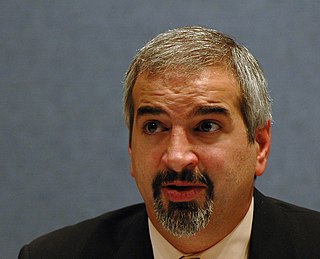A Quote by Noam Chomsky
Establishing a client state in Iraq would significantly enhance that strategic power, a matter of great significance for the future. As Zbigniew Brzezinski observed, it would provide the US with "critical leverage" of its European and Asian rivals, a conception with roots in early post-war planning. These are substantial reasons for aggression - not unlike those of the British when they invaded and occupied Iraq over 80 years earlier, at the dawn of the oil age.
Quote Topics
Related Quotes
There has been a good deal of comment — some of it quite outlandish — about what our postwar requirements might be in Iraq. Some of the higher end predictions we have been hearing recently, such as the notion that it will take several hundred thousand U.S. troops to provide stability in post- Iraq, are wildly off the mark. It is hard to conceive that it would take more forces to provide stability in post-Saddam Iraq than it would take to conduct the war itself and to secure the surrender of Saddam's security forces and his army — hard to imagine.
It is convenient for Hillary Clinton and Tony Blair to say the rise of the Islamic State has nothing to do with the Iraq War because that takes the culpability off their shoulders. The Islamic State is a product of the Iraq War. It took about a 100 years to build the Iraqi state, and the Americans and the British destroyed it in an afternoon.
Iraq has the second largest oil reserves in the world, it is right in the midst of the major energy reserves in the world. Its been a primary goal of US policy since World War II to control what the State Department called "a stupendous source of strategic power" and one of the greatest material prizes in history.
There is a clear and strong link between the economy's present woes and the Iraq war. The war was at least one of the factors contributing to rising oil prices - which meant Americans were spending money on imported oil, rather than on things that would stimulate the american economy. Hiring Nepalese contractors in Iraq, moreover, doesn't stimulate the American economy in the way that building a school in America would do - and obviously doesn't have the long term benefits.
I think what history will show is that one of the most tragic results of the war in Iraq will be that although Sharon, the Likudites, the Neoconservatives in our country, President Bush and the Democratic party thought the war in Iraq and destroying Saddam would benefit Israeli security, we're seeing absolutely that the war in Iraq has probably put Israeli security in a more tenuous condition than it's been in since the founding of the Israeli state.
Since United States military operations in Iraq began in 2003, I have visited Iraq at least 15 times. But unlike politicians who visit, the question for me has never been why the U.S. got into Iraq. Instead, as the CEO of Blackwater, the urgent question was how the company I head could perform the duties asked of us by the U.S. State Department.





































